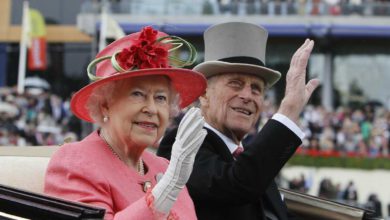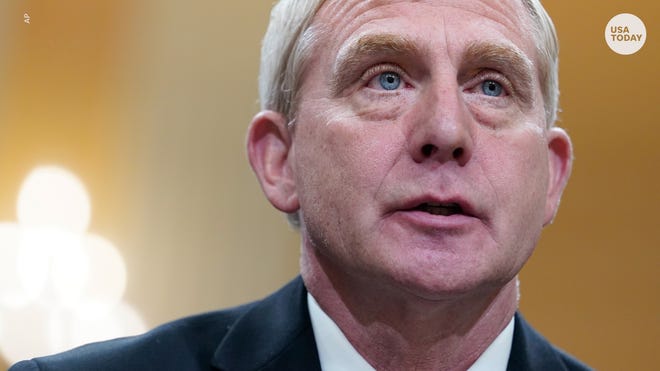
Seven jurors that convicted former Minneapolis police officer Derek Chauvin in the murder of George Floyd spoke publicly for the time Thursday night, sharing their experiences in the courtroom and how the trial impacted their lives.
In April, the jury found Chauvin guilty of second- and third-degree murder and second-degree manslaughter in Floyd's killing outside a Cup Foods store last Memorial Day. Chauvin, 45, who is white, was seen on cellphone video pinning Floyd, a 46-year-old Black man, to the ground with his knee for over nine minutes after police responded to a report that Floyd used a counterfeit $20 bill.
Floyd's death sparked nationwide protests over police brutality and systemic racism. That led defense attorneys and Hennepin County District Court Judge Peter Cahill to worry they wouldn't be able to find an impartial jury.
In an interview with CNN host Don Lemon on Thursday, the jurors, who deliberated for about 10 hours over two days, said they took the responsibility "seriously."
“I want people to know that due diligence was done," said juror Nicole Deters. She showed Lemon the four legal pads she had filled with notes during the deliberation.
Jodi Doud, another juror, said the jury took many votes throughout the process to determine whether Chauvin was guilty. The jurors quickly agreed he was guilty of second-degree murder and manslaughter, but it was more difficult to come to a decision regarding the third-degree murder charge, they said.
Related:Minnesota judges hide jurors' names when police go on trial in killings
Chauvin verdict analysis:Anonymous jury in Derek Chauvin trial part of a growing trend that has some legal experts worried
'I think we came with the right verdict':First juror in Derek Chauvin trial to speak publicly says he didn't feel pressure to reach a guilty verdict
The "light bulb moment" in deciding Chauvin was guilty of third-degree murder was when the jurors focused not on what Chauvin did, but what he failed to do.
"He did not provide life-saving measures for George Floyd when he knew the guy was in pain or needed medical attention," Doud said. "That, to me, said more than what he actually did.”
Chauvin was sentenced to 22 1/2 years — a sentence higher than the presumptive 12 ½ years after the judge agreed with prosecutors that there were aggravating factors in Floyd's death, which sparked nationwide protests over police brutality and systemic racism.
“I think we got here because of systemic racism in the system,” Deters said. “But when it came down to all three verdicts, it came down to the facts and the evidence.”
The biggest piece of evidence in the trial, according to jurors, was the video of Chauvin holding his knee down on Floyd's neck for several minutes, as Floyd struggled and repeatedly said "I can't breathe."
The jurors had to watch the video countless times, they said.
“It is definitely in my spirit and it will always be there," said juror Sherri Belton Hardeman. "Seeing that video and watching George Floyd call for his mom just broke my heart.”
Hardeman herself is a mother. "It just kind of haunts me," she said. "And it’s something that will always live with me.”
'There is still racism in the world':Race at forefront of jury questioning in trial over Ahmaud Arbery's death
Judge Peter Cahill, who oversaw the murder trial, said Monday that he will make the names of 15 jurors and alternates who sat in the courtroom public on Nov. 1. He initially kept the names of the jurors sealed, citing the high-profile nature of the case, and had ordered that their identities remain secret for at least 180 days after the verdict.
A media coalition, which includes USA TODAY, had asked Cahill to release the jurors’ identities, saying the media and public have a right to the information and there was no known threat to juror safety that would warrant keeping their names sealed.
Juror Tossa Edorh said when he hears the news today, the video plays over and over in his mind. "I wake up with nightmares,” Doud admitted. “It’s something I will never forget, no matter how much therapy I’ve already done.”
"I don't want the media at my door," Doud said. "I want to go on with my life."
Chauvin's defense team criticized Floyd's past, which involved drug abuse and criminal history. But Floyd's history "didn't even come up in our deliberations," according to Doud.
Alternate juror Lisa Christensen said it upsets her when people dismiss Floyd's death because of his past.
"It angers me that people can judge him based on the decisions he made and his decisions in life, which has nothing to do with this,” Christensen said. “Everyone has the right to live, and have dignity.”
Near the end of the interview, Doud offered a message to Floyd's family: "We hope, as a group, we did the right thing," she said.
Contributing: Kevin McCoy and Grace Hauck. USA TODAY; The Associated Press
Source link









